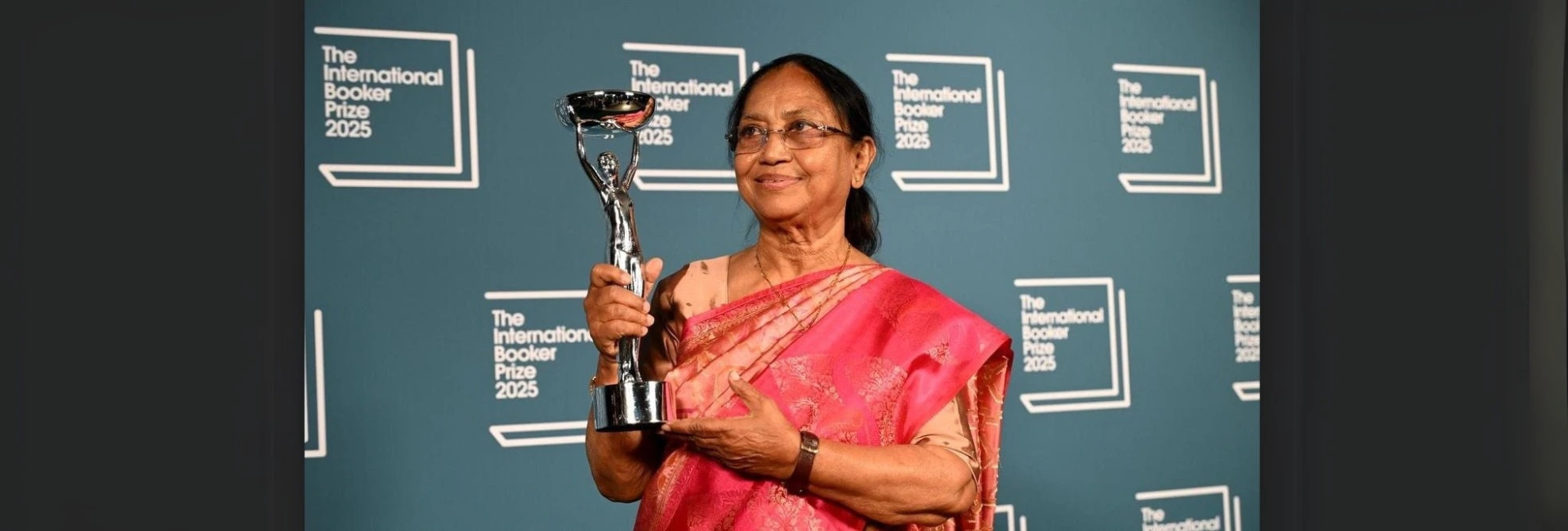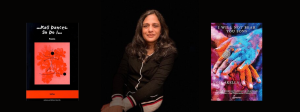(May 24, 2025) 77-year-old Banu Mushtaq, author, lawyer, activist, and literary trailblazer has etched her name into history by becoming the first Kannada-language writer to win the International Booker Prize. Her short story collection, Heart Lamp, translated by Deepa Bhasthi, earned them the prestigious International Booker and a shared £50,000 award. “This feels like a thousand fireflies lighting a single sky – brief, brilliant and utterly collective,” Mushtaq said at the Booker ceremony. “I accept this great honour not as an individual but as a voice raised in chorus with so many others.”
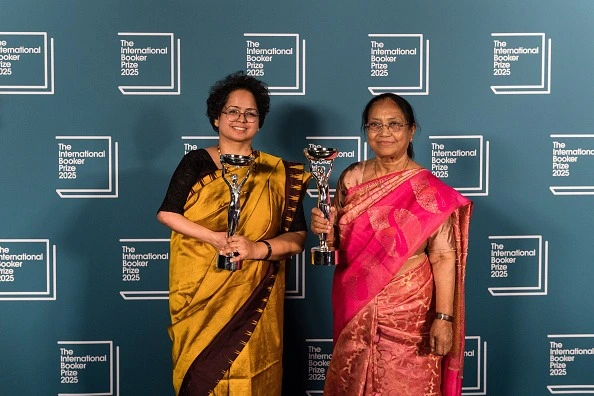
Deepa Bhasthi and Banu Mushtaq
India rejoices, Karnataka celebrates
The celebration of Banu Mushtaq’s International Booker win was not confined to the literary stage, it swept through India especially Karnataka like a cultural festival. “Oh, you should see what the people are celebrating back home,” Mushtaq who was in London for the award ceremony told the BBC, her face glowing with emotion hours after her win. “They were awake the whole night. At 2:00 (in the morning) they called me continuously. When the prize was announced, it was midnight back home, and everyone was awake, watching.” The joy rippled from the villages to the cities, as social media lit up with praise and phone calls poured in. “Even the Chief Minister of Karnataka tweeted in the morning to congratulate me,” she said, adding that “so many stalwarts, and the common people too (are celebrating). I cannot imagine, I don’t know how to tell you, you should go and witness it. It’s like a big feast there.” This overwhelming response reaffirmed the cultural pride tied to her achievement.
This book is my love-letter to the idea that no story is local, that a tale born under a banyan tree in my village can cast shadows as far as this stage tonight. To every reader who journeyed with me, you have made my Kannada language a shared home. It is a language that sings of resilience and nuance.
Banu Mushtaq
The quiet power of Heart Lamp
Heart Lamp is seeped in literary empathy. Spanning three decades of writing (between 1990-2023), the twelve stories expose the emotional and social bruises inflicted on women by religion, custom, and male entitlement. “My stories are about women, and how religion, society and politics demand unquestioning obedience from them, and in doing so, inflict inhumane cruelty upon them,” she told the Booker Prize Foundation. Judges praised the collection’s immense emotional and moral weight, describing the characters as astonishing portraits of survival and resilience. In a literary world that prizes spectacle, Mushtaq’s gift lies in attention to lives lived at the edges, to the strength it takes simply to persist.
Early life and finding her voice in a new language
Born in 1948 in Hassan, Karnataka, into a traditional Muslim household, Mushtaq’s literary rebellion began with language. Though the community expected girls to learn only Urdu and the Quran, her forward-thinking father enrolled her in a convent school with Kannada as the medium of instruction. She became fluent in Kannada rapidly and later said in an interview with Vogue India, “I started writing the moment I learned the alphabet.” Fluent in Hindi, Dakhni Urdu, and English, Mushtaq made Kannada her weapon of choice, harnessing its raw, earthy expressiveness to explore caste, gender, and social inequality.
In a world that often tries to divide us, literature remains one of the last sacred spaces where we can live inside each other’s minds, if only for a few pages.
Banu Mushtaq
Trauma, despair, and the turn to writing
Her journey to becoming a writer was neither linear nor easy. After marrying for love at 26, she was expected to give up her ambitions. “I had always wanted to write but had nothing to write because suddenly, after a love marriage, I was told to wear a burqa and dedicate myself to domestic work. I became a mother suffering from postpartum depression at 29,” she told Vogue. In despair, Mushtaq nearly ended her life. “One day, I doused myself with white petrol. With a matchbox in my hand and ready to strike, it was my husband, who I had married for love, who clung to me and kept our three-month-old daughter at my feet, telling me to stop,” she recounted. This harrowing moment is reimagined in Heart Lamp’s title story. Her character, Mehrun, drenched in kerosene, is stopped by her children. “She picked up the baby and pulled Salma, her young daughter, to her chest, feeling as if she was being comforted, touched and understood by a friend,” writes Mushtaq. “All she could say was ‘Forgive me, my darling.’”
A prolific literary voice
From that trauma emerged a torrent of literary expression. Mushtaq’s first short story was published in Prajamata in her late twenties, and she never looked back. Over the decades, she authored six acclaimed short story collections including Haseena Matthu Ithara Kathegalu, a powerful novel titled Hennu Haddina Swayamvara, a compelling essay collection, and a deeply introspective poetry book. Each work echoes her commitment to amplifying the silenced. Her early story Kari Nagaragalu, about a Muslim woman abandoned by her husband was adapted into the 2003 National Award-winning film Hasina, bringing national attention to her piercing narratives.
My family often told my father that I would get our nose cut. Now I hope, even though he is no more, I brought glory instead.
Banu Mushtaq
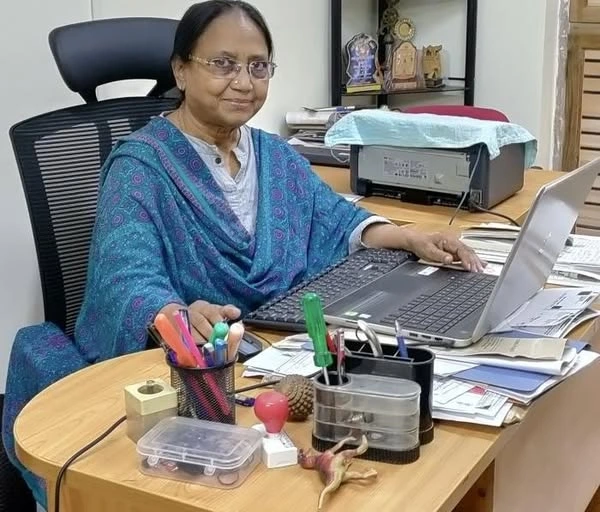
Literature as activism
Mushtaq’s resistance goes beyond fiction. In her earlier years, she worked as a reporter at the award-winning tabloid Lankesh Patrike and contributed to All India Radio. She became a vocal figure in the Bandaya Sahitya movement, using literature as protest against caste and social oppression. Later, she served two terms in the municipal council and practiced law to support her family. But writing remained her north star. Her essays, journalistic pieces, and fiction collectively form a fierce case of dissent. Her literary scope isn’t confined to gender; it unflinchingly interrogates religious, patriarchal, and political power.
A target for speaking out
Mushtaq’s candour and defiance have made her a target. In 2000, after publicly supporting women’s right to pray in mosques, she received threats, faced a fatwa, and was physically attacked in her office. “The Muslim community around me want to ostracise me. They think I am winning accolades by getting thoo-thoo done on them,” she told Vogue. It was her daughter who ultimately asked her not to press charges against the attacker, earning her mother the judge’s ire. Yet Mushtaq remains undeterred. “I have consistently challenged chauvinistic religious interpretations. Society has changed a lot, but the core issues remain the same.”
Just hand-hold, that’s all. This is my only request to my fellow human beings.
Banu Mushtaq
Translation and recognition
Heart Lamp’s global journey would not have been possible without Deepa Bhasthi. The Karnataka-based writer-translator, who began translating Mushtaq’s work in 2022, and became the first Indian translator to win the International Booker. “Her critique of society and religious fanaticism is very subtle, a quality I admire most about her work,” Bhasthi said talking about Banu Mushtaq. Their collaboration has ignited a wider conversation about translation as cultural bridgework, and the importance of bringing South Asian regional literature into global focus.
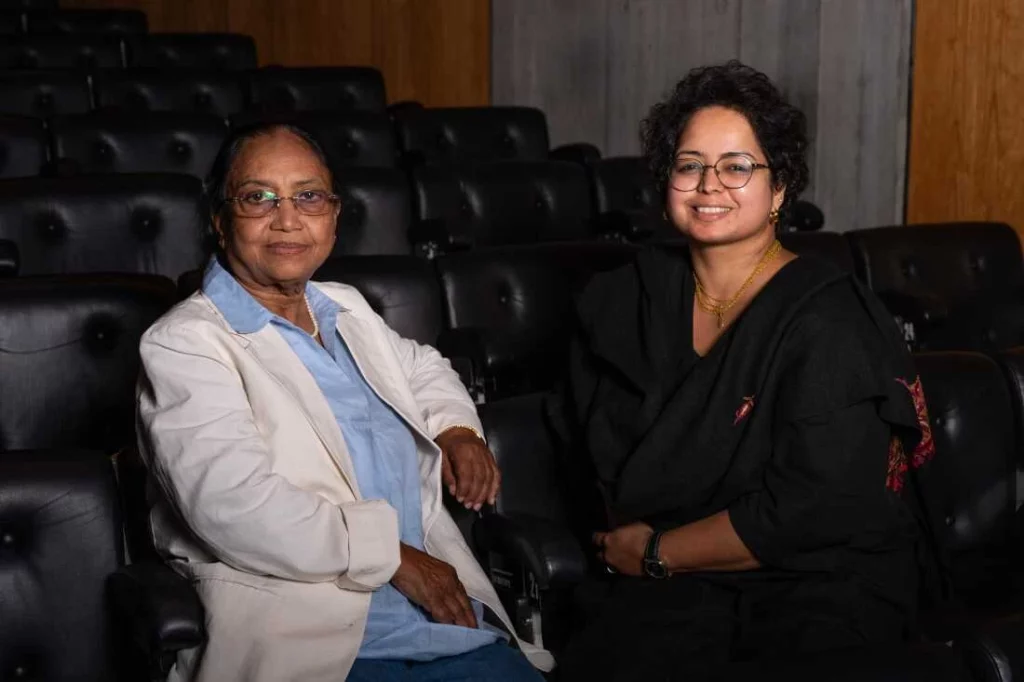
Banu Mushtaq and Deepa Bhasthi
A celebrated legacy
Mushtaq’s literary achievements are as numerous as they are prestigious. She received the Karnataka Sahitya Academy Award in 1999 and the Daana Chintamani Attimabbe Award. In 2024, Deepa Bhasthi’s translation of Haseena and Other Stories won the PEN Translation Prize, making way for the Booker win a year later.
A pen that won’t pause
The 77-year-old writer continues to live and write in Karnataka. Her stories are timeless but urgent, rooted in a world of narrow alleys and sprawling silences, of kitchen corners and courtroom debates. Through it all, she writes for those whom history tries to forget. “This book was born from the belief that no story is ever small; that in the tapestry of human experience, every thread holds the weight of the whole,” she said at the Booker ceremony.
For the Booker-winning author, writing isn’t just expression. It’s survival. It’s rebellion. It’s life.
Also Read: From foreign shores to Indian stories: Exploring the foreign authors enthralled by India
Also Read: How entrepreneur-author Adhirath Sethi is creating impact through books and Agastya Foundation
Also Read: From LSE to Bestseller: Pushkar Anand’s debut book is making spiritual wisdom go global
